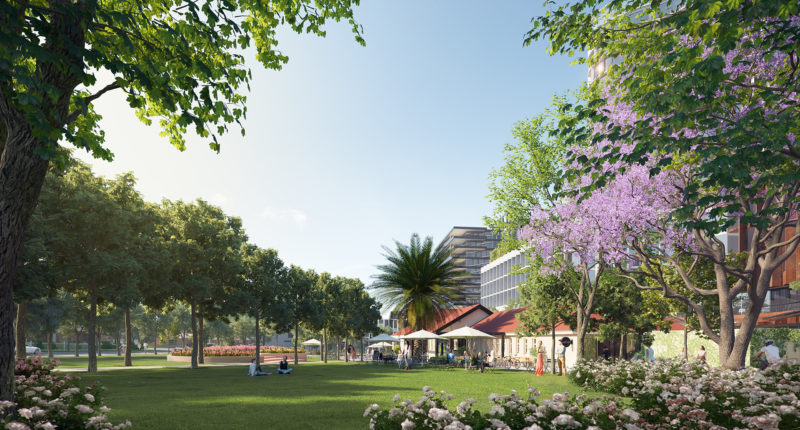- Research conducted by the Nature Based Cities initiative and Ark Resources has found tree planting and retention is not a mandatory requirement for accreditation
- All research conducted by the initiative will be open-source and publicly accessible.
- Research backer Paul Hameister OAM hopes the findings will lead to more green space in urban developments
New research has brought into question the “green” credentials of Australia’s most highly ESD-rated buildings.
The research, conducted by Nature Based Cities and Ark Resources, has reviewed the efficacy of Environmentally Sustainable Design (ESD) rating tools, and found that not one of the five most common accreditations schemes required tree planting, retention or nature-based landscaping as a mandatory requirement.
Green Star, Built Environment Sustainability Scorecard (BESS), BASIX, EnviroDevelopment and Climate Active are the five specific ESD rating tools reviewed by the duo.
The study concludes that projects can achieve a ‘green’ rating without a single tree being planted or retained.
Nature Based Cities, backed by the private sector and research partners such as Urbis, is seeking to communicate the environmental, societal, economic and cultural benefits of greener cityscapes.
All research conducted by the initiative will be open-source and publicly accessible.
The study alongside an Urbis report titled “The Growing Value of Green Space” is being used to prioritise the inclusion of greenspace among urban projects.
Urbis noted in its report that park-front units attracted a 17% price premium on average, with houses recording a 34% premium, compared to surrounding properties. This data suggests such property is highly inciting for would-be purchasers and investors.
Majority of world’s population in urban spaces
While less than 5% of the earth’s surface is in urban space, 55% of the human population lived in cities in 2018 – a figure which is expected to rise to 65% by 2050 – further emphasising the importance of more green spaces in urban settings.
“The goal of Nature Based Cities is to encourage developers and large property owners to reverse urban tree loss and create new green space in our cities, while offering planners, designers, and developers a much-needed framework to incorporate more green open space into projects in cities’ inner and middle-ring suburbs,” said Paul Hameister OAM, who has backed the research
“Looking further afield we are advocating to refine Australia’s Environmentally Sustainable Design (ESD) standards to include greenery as part of their rating systems.
“We’re at a critical juncture concerning the climate. While many of the current environmental issues we’re facing have stemmed from urbanisation, our cities’ contributions towards addressing these global challenges are increasingly important.”

Mr Hameister said he found it “outrageously deficient” that a buildings could receive 6-star Green Star ratings without a single tree.
“One of the simplest and most effective ways we can cool the earth and address climate change is to retain and plant more trees, and it’s time to provide every tool possible to the development industry to be a leading force for this change – starting with an urgent update to our Nation’s ESD accreditation tools,” he added.
“Through Nature Based Cities, we seek to provide other property developers and institutional property owners open access to research, starting with work commissioned through the University of Melbourne and Urbis.
“We hope this research will contribute to decisions to incorporate more green open space and trees in future developments.”








